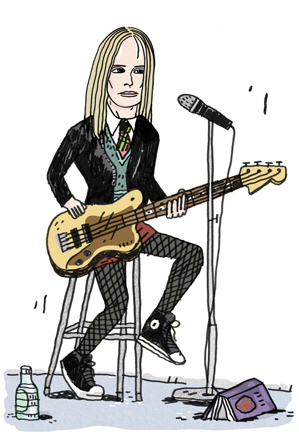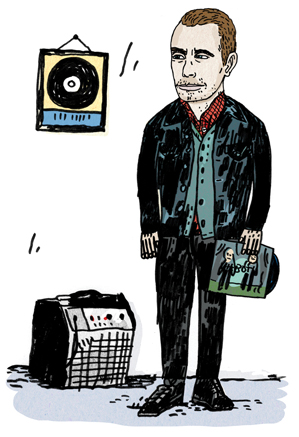Survival in the Age of Spotify
Mann: Ted, we are both intimately affected by the issues discussed in Cory Doctorow’s book Information Doesn’t Want to Be Free. I was very apprehensive about how to approach it. I thought, “If I’m going to be reading a bunch of suggestions about how I can tweet for couches to sleep on after shows, I’m going to be really depressed.” And in fact, in the beginning of the book there’s a lot of that language we’re familiar with that comes across as: “Those artists out there who were doing okay by the old systems and now are flailing—too bad! Sorry, lamplighters! Too bad you couldn’t keep up, buggy-whip makers!”

Leo: I’ve been frustrated that artists are not allowed to have a nuanced position. We seem to get shoehorned into the extreme camps of “completely pro–free culture” or “completely anti-technology.” When the record labels or publishing houses get together to hammer out deals with intermediaries (be they ISPs, streaming services, or digital storefronts), we are rarely, if ever, invited to the table and have no choice but to react to what’s already been decided. As someone who loves the Internet but hopes for more creative solutions to “free vs. paid” than the binary extremes we seem to be forced to choose between, I am pretty tired of that language. It’s off-putting to have a book that purports to have your best interests at heart open with so much of that language of conflict.
Mann: Right, and I’m not opposed to the usual solutions along the lines of “Tour more and sell T-shirts,” because that’s what we’ve been doing for decades. Nor am I opposed to the idea of musicians raising money through crowdfunding. I like all the creative energy you can put into premiums, videos, etc. You have to find a way to creatively self-market. But the need to keep turning up the volume and increasing the spectacle, clamoring for attention online, sometimes starts to sink to the level of an old-timey PR stunt, along the lines of flagpole sitting, and that isn’t appropriate for certain kinds of art or artists.
Leo: Indeed. And it isn’t guaranteed to be effective. I am truly moved seeing artists create mutually beneficial exchanges with their fans through crowdsourcing. But it’s worth considering, also, that in this particular model, fans’ investment in the person and personality of the artist drives their loyalty almost as much as the music. It’s an awesome thing to witness, but I’m not sure a market based on that model could even sustain more than a handful of successes. So it’s important to be careful of saying that this is the future—the only way to sustainability.
Things Reviewed
Information Doesn’t Want to Be Free
By Cory Doctorow
McSweeney’s, 2014
Mann: There’s no one-size-fits-all solution. Even identifying the problems facing artists as universal is wrong. Circumstances change, and artists are usually some of the most adaptable people on the planet.
Leo: The fact that we both felt put on the defensive by the tone early on is a flaw in the book itself. Because as Doctorow delves into the history of copyright law and digital locks later on, I found myself rapt and in pretty close alignment with his assessment of how negatively those locks affect us broadly—culturally, societally.
Mann: Oh, he hates digital locks. Do not bring a digital lock around Cory Doctorow!
Leo: And I agree with him. I hated Apple’s digital rights management from day one. I remember trying to DJ my sister’s wedding and wanting to play a few things from my library off someone else’s iTunes, having to deauthorize and reauthorize computers, and manage iPods and hard drives, etc.—First World problems, maybe, but frustrating impediments to just enjoying music, nonetheless. And probably more importantly, Doctorow opened my eyes to some of the more secretive and more nefarious ways digital locks are operating.
Mann: Yes. One of the most frightening things I learned is how locks are baked into our machines. We’re actually ceding control and choice and allowing our computers to do things we don’t even know.
“When the record labels or publishing houses get together to hammer out deals with intermediaries … we have no choice but to react to what’s already been decided.”
At this point I have to go back to your point about the initial tone being a problem with the book, because it reads a bit like notes from a lecture or a TED talk. It’s more a collection of essays with a lot of asides and sidebars, but the through line is hard to discern.
Leo: There are passages that, when I think about them being spoken to a live audience, sound better than they read on a page.
Mann: It makes me wonder if the dynamic in publishing is similar to the one in the music world that makes people say “Tour more”—one that’s placing authors in the position of finding a better (or at least supplementary) business model in generating speaking fees than in selling books.
To jump ahead, then, to what I’d call the third section, in which he finally lays out his idea for getting people paid for the content they create, I was interested and pleasantly surprised at how artist-friendly it seems to be.

Leo: I agree. For the unfamiliar, in general, the performers’ rights organizations (ASCAP, BMI, SESAC) administer the copyrights for a vast collection of musical work and license the use of these catalogues.
Mann: The license takes a percentage of the gross revenue of, for example, an FM radio station, and out of that sum disburses royalties to composers.
Leo: And in principle, it works similarly with the streaming services, but it’s very convoluted. Pandora, for example, operates under licenses that pay both performers and composers, though in a proportion that, unlike radio licenses, leaves composers feeling shorted. To make it even more confusing, Pandora also does direct deals with rights holders (usually labels, but theoretically composers as well). Spotify and YouTube, however, have their own rates that they’ve negotiated directly with the big three record labels (which also are investors in Spotify), often leaving independent artists and labels in a;“take it or leave it” situation that affects their bottom line more severely. At the same time, it sets a high standard for entry into the streaming market that many innovators can’t afford.
Doctorow’s idea is essentially that the sorts of blanket licenses that are used in radio could be fitted to Internet streaming or downloading, with artists actually guaranteed a (rather large) percentage of the pay-out pie. Innovation would be easier, with services—especially startups—able to focus on delivering ever better experiences instead of having to spend inordinate amounts of time and money;negotiating with big labels and publishing houses.
It hasn’t gotten a lot of play, but the idea’s been around for a while. Jaron Lanier has written about his vision for having nano-payments sent to every originator of content that is referenced or used anywhere. Doctorow’s idea almost seems like the version that the big labels, publishing houses, and intermediaries would eventually water Lanier’s plan down to!
Mann: Ha! And in fact, just this winter the U.S. Copyright Office issued some new recommendations on exactly this—how music licensing can be updated to better reflect the new realities of how we create and experience music. I do like it as a creative solution that might actually encourage art and innovation for people just jumping in or even decades into a career.
Leo: Yes. Look—as dumb as this may sound, I am an old punk rocker and fan of futurism and still find a lot to get excited about in the Silicon Valley mantra of “Break shit, apologize later.” I understand the frustrations with “The System,” writ large, and digital locks, specifically, and the creative spirit that drives people to want to “break” them, but ultimately, it’s because we’re makers. I appreciate where Doctorow eventually lands in this book, and I think there’s something to be said for the hope of being able to focus more on actually “making shit” when we no longer need to “break shit.”
Aimee Mann and Ted Leo play in a duo called the Both.
Keep Reading
Most Popular
Large language models can do jaw-dropping things. But nobody knows exactly why.
And that's a problem. Figuring it out is one of the biggest scientific puzzles of our time and a crucial step towards controlling more powerful future models.
The problem with plug-in hybrids? Their drivers.
Plug-in hybrids are often sold as a transition to EVs, but new data from Europe shows we’re still underestimating the emissions they produce.
Google DeepMind’s new generative model makes Super Mario–like games from scratch
Genie learns how to control games by watching hours and hours of video. It could help train next-gen robots too.
How scientists traced a mysterious covid case back to six toilets
When wastewater surveillance turns into a hunt for a single infected individual, the ethics get tricky.
Stay connected
Get the latest updates from
MIT Technology Review
Discover special offers, top stories, upcoming events, and more.